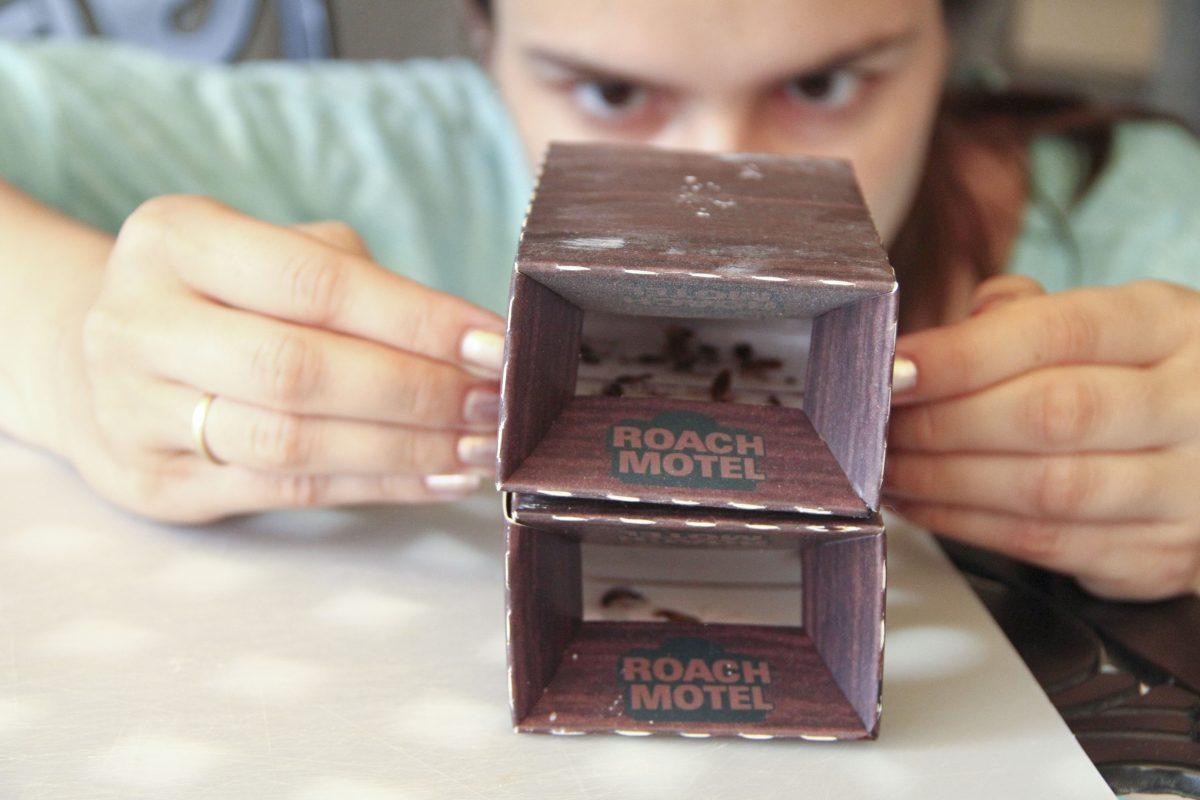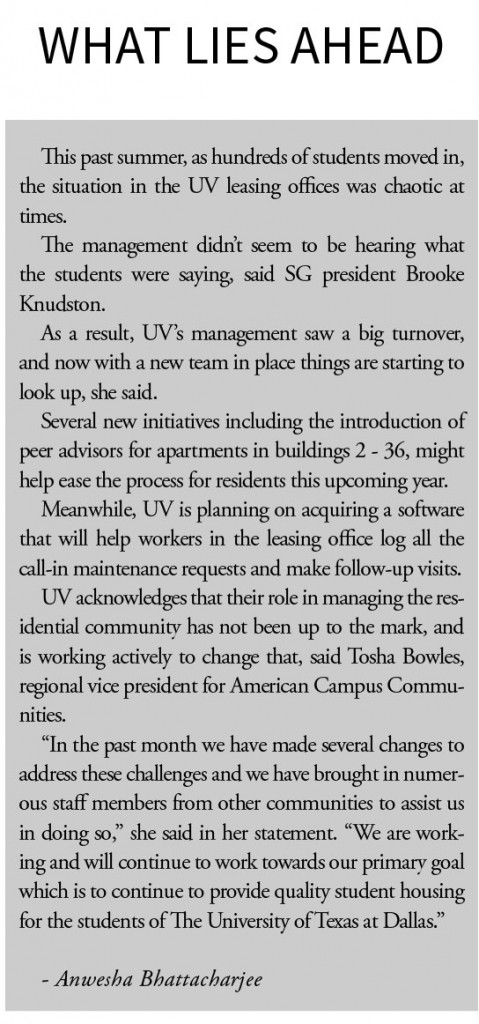UV management, residents inherit poorly maintained apartments a year after Waterview Park buyout
More than a year after Waterview Park was bought out by the university, the poor quality of apartments in phases 1-4 is putting a strain on University Village’s management.
As a result, several residents from apartments in phases 1 to 9 claimed maintenance has been slow this past year with markedly poor response times during this year’s move-in period.
“Honestly, I think it’s poor management and they’re overwhelmed. I don’t know what they’re doing,” said biology senior Michael Lai. “(My) freshman year I lived in UV in building 68, and they were fine. We never really had any problems with them and the problems we did have, they’d fix right away. But now, they have Waterview and there’s more people, and it seems like they’ve lost their heads.”
Lai and his roommate, biology senior Sanket Shah, moved into a phase 3 apartment two years ago when Waterview Park still owned and managed the apartment building, but there seems to be more problems since management changed hands last year, Lai said.
“I’m seeing all of these problems because Waterview did not take care of its apartments…” said SG president Brooke Knudston. “And whenever UV bought over this lot, they undertook a lot of problems to fix.”
New maintenance personnel have been hired, said Matt Grief, associate vice president for student affairs, in a statement to The Mercury. A clarification could not be obtained as to whether the new staff replaced existing employees and if the overall number of maintenance workers has increased.
Even with the turnover in staff, emergencies in the apartments still must be tended to. Accounting sophomore David Meeds moved into his apartment this past June. Days after moving in, a water pipe burst in the vacant apartment above and flooded his apartment.
Despite receiving the call late on a Saturday night, UV’s maintenance personnel came within 45 minutes and fixed the problem, he said.
Maintenance workers were prompt about replacing the carpet in his closet as well as resurfacing and painting his bathroom counters after the incident, Meeds said.
“University Village, I think, does the best they can because these apartments are really old so they always have problems,” he said.
However, his medicine cabinet had to be taken out after sustaining water damage, and two months later, it has yet to be replaced.
In the past year, UV, which is managed by American Campus Communities, has undertaken several major projects such as replacing appliances and water heaters and reconstructing balconies in a large number of apartments, said Tosha Bowles, regional vice president for ACC, in a statement to The Mercury.
“While this transition and upgrade was largely successful and we have received a lot of positive feedback from students, we certainly see where we have experienced some challenges in certain areas and we’ve had our fair share of growing pains,” Bowles said. “While we believe we have satisfied the vast majority of our students, we know that some areas were not as good as we all want.”
Grief said the upgrades and maintenance of buildings 2–36 cost a total of $2 million.
Since the convergence, upkeep for community spaces has been a challenge to maintain. The swimming pool and the lawns around the apartments are always dirty, said Yulia Vorotyntseva, an operations management doctoral student.
“On the (one) hand, prices went down,” she said. “We don’t pay for the water or the Internet anymore. Unfortunately, the maintenance also went down.”
Vorotyntseva found bed bug bite marks all over her arms as she sat reading in the phase 2 social center and claims the community study lounge is a hub for insect and bug infestations.
A resident of phase 2 for two years, she noticed a severe infestation of roaches in her apartment in the past year. UV is fast at responding to reports of infestation and the first treatment is usually prompt, but the follow-ups are markedly slower, she said.
Fed up with having to empty out her kitchen for treatment several times and waiting three weeks for UV to show up for a follow-up, Vorotyntseva brought in roach traps to control the pests.
Meeds and his roommate Zakariya Ahmed, a biology junior, found roaches in their empty apartment and bought traps the night they moved in. They have seen roaches fall from the ceiling and creep through the cracks in spots where the vinyl flooring is peeling off.
UV inspects apartments quarterly and treats apartments in response to reports of infestation, Grief said in his statement. Follow-ups are conducted in extreme cases of pest problems.
Residents in phases 1-4 aren’t the only ones with concerns. A quick survey of a few buildings in phases 5-9 indicated that several apartments had mild to severe occurrences of mold.
Most students reported that maintenance was prompt in attending to the apartments, and students seemed to have had no issues with delayed response times.
Maintenance is diligent about cleaning and painting the area with mold, often caused due to lack of proper cleaning or delayed reporting of leaks, Grief said. American Campus Community’s protocol for serious mold in apartments can even involve removing of parts of the apartment to fix the problem, he said.
Most of these problems, including pests, are not unusual for housing properties of this age and size, Grief said.
ACCOUNTING ERROR
Minor maintenance problems aside, computer science junior Collin Campbell, who lives in phase 7, had a different kind of trouble.
He set up his auto-debit online so his rent would be withdrawn from his bank account directly. Several times in the past two years, however, he received notices of no payment from UV.
He went into the leasing office to ensure that no late fees were incurred because the online payment portal was faulty, but he continued to receive late fee notices until several months later.
When Campbell went into the leasing office to speak to management about the faulty portal, no one from top management was available to meet with him in person, he said.
While his allegations were directed toward the previous management under former manager Corey Dargan, the new management under Bowles will follow an open door policy, she said.
Vorotyntseva also had issues with UV’s rent payment system.
Under the account management system at UV, two different accounts are created for students who share an apartment.
Twice she received a notice from UV informing her that she had not paid her rent well past the due date. Twice she went to the leasing office, Vorotyntseva said, only to find out her payment had been processed to a nameless account that would have been her roommate’s had she had one.
AMENITIES
Another major issue residents have is the lack of fast Internet connectivity, and several students have raised complaints to SG, Knudston said.
It takes Meeds and Ahmed 30 minutes to connect to the Internet, Medi said. While he is willing to pay Time Warner Cable more for faster Internet, Meeds said he is not sure that it would work because the apartments are still wired with coaxial cables instead of the modern optical fiber cables.
The network in the University Commons has been upgraded recently, but Wi-Fi connectivity issues remain a big problem for residents. SG will soon conduct a student survey to find out where the pockets with poor connectivity are in order to improve online access to students, Knudston said.
Shah, from phase 3, was forced to live in his apartment without Internet, a utility included in the lease agreement, for several weeks last winter when one of his roommates uninstalled his personal router and moved out. Despite repeated emails to Dargan and visits to the office, Shah finally threatened UV with nonpayment of rent and legal action for lease violation, Shah said.
The issue was ultimately resolved and Shah was provided with a $20 lease-violation compensation, he said. UV response on this incident could not be obtained because Dargan no longer works there.
The biggest challenge for Meeds and Ahmed was the lack of certain amenities that are taken for granted by students, Ahmed said. Their apartment did not have light fixtures in the room, and his room did not have an Ethernet outlet — problems that maintenance can’t fix while a resident occupies the unit.
“It’s nice having new appliances — I like having a microwave, a dishwasher, a fridge and a washer and dryer, don’t get me wrong,” Ahmed said. “But they need to upgrade the entire apartment if they need me to pay the entire price.”
Knudston, a resident of phase 3 herself, said students living in phases 5-9 pay slightly more each month for a comparable floor plan than students living in phases 1-4.












